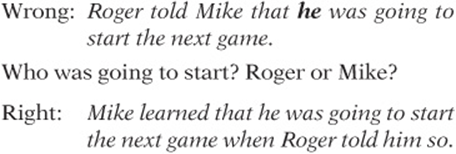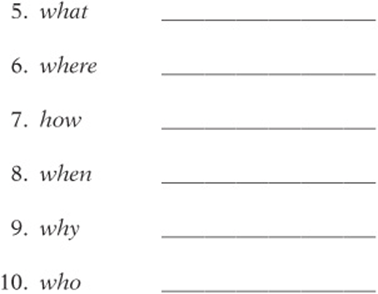SAT Test Prep
CHAPTER 15
ESSENTIAL GRAMMAR SKILLS
Lesson 5: Pronoun-Antecedent Disagreement
Pronouns
A pronoun is a word (such as it, he, she, what, or that) that substitutes for a noun. A pronoun is either definite (like it, you, she, and I) and refers to a specified thing (or person or place or idea) or indefinite (like anyone, neither, and those), and does not refer to a specific thing (or person or place or idea).
Definite Pronouns and Antecedents
Every definite pronoun refers to (or takes the place of) a noun in the sentence, called the pronoun antecedent. The pronoun must agree in number (singular or plural) and kind (personal or impersonal) with its antecedent.

Because everyone is singular, their is the wrong pronoun.

The pronoun that is impersonal, but of course, David is a person.
![]()
The antecedent of a definite pronoun should be clear, not ambiguous.

Interrogative Pronouns
An interrogative pronoun (like what, where, why, and when) usually asks a question or refers to an unknown, as in Where are my keys? But sometimes it can be used as a definite pronoun. When it is, remember two points:
Use what only to refer to a thing, where to refer to a place, when to refer to a time, why to refer to a reason, who to refer to a person, and how to refer to an explanation.

An anachronism isn”t a time, is it? It”s a thing.

When following a comma, an interrogative pronoun usually takes the immediately preceding noun as its antecedent.

This is awkward because the sets are not what the pronoun who is logically referring to.

Pronoun Consistency
Be consistent with any pronouns you use to refer to the same thing more than once in a sentence.

It sounds like we can”t make up our minds about whom we”re talking to!

Concept Review 5: Pronoun-Antecedent Disagreement
1. Name three definite pronouns: ______________________________
2. Name three indefinite pronouns: ______________________________
3. Every ____________________ pronoun requires a specific antecedent.
4. What is an antecedent?

After each interrogative pronoun, write what kind of noun it must represent.

Circle all pronouns in the following sentences, and make any corrections that may be necessary.
11. There are too many legal situations where misrepresentation seems to be standard practice.
__________________________________________________________________________________________________
12. If a student wants to memorize the meaning of a word, you should begin by understanding the concept it represents.
__________________________________________________________________________________________________
13. Caroline passed the phone to Julia, but she couldn”t bring herself to speak.
__________________________________________________________________________________________________
14. Neither of the dogs wanted to give up their territory to the other.
__________________________________________________________________________________________________
15. David volunteered to be a ticket taker, not wanting to be the one that cleaned the aisles after the show.
__________________________________________________________________________________________________
16. They lost the game, which is why they didn”t celebrate afterwards.
__________________________________________________________________________________________________
Worksheet 5: Pronoun-Antecedent Disagreement
Correct any pronoun errors in each of the following sentences.
1. Although the British parliament conducts debates under very formal and decorous rules, they can often produce very animated arguments.
2. Brown has always been committed to assisting their students by providing him or her with any necessary financial aid.
3. The media ignored the reports, probably because it believed they were not what the public was ready to hear.
4. The agency decided that they would give control of the project exclusively to Fiona and me.
5. Each of the girls wanted their idea for the logo design to be considered.
6. No one who has been through the first week of boot camp ever believes that they will make it through the entire six weeks.
7. Although you shouldn”t read carelessly, one doesn”t need to read slowly, either.
8. Neither gentleman thought that their team could win the championship.
9. Students sometimes aren”t ready to handle the extra work when his or her courses become more demanding.
10. Many modern novels are concerned with situations where love goes unrequited.
11. Everybody is expected to do their share.
12. The entire team turned out to be robots who had been programmed to play lacrosse.
13. The radio station”s board of directors drafted a proposal modifying their advertising policies.
14. The museum received so many donations that they actually had to return over a million dollars to the benefactors.
15. They usually give the most points to the skater that makes the fewest mistakes.
16. I like movies where the guy gets the girl.
17. Each swimmer will have a lane to themselves.
18. Who was the one that made the error in the third inning?
Answer Key 5:
Pronoun-Antecedent Disagreement
Concept Review 5
1. I, you, she, he, it, they, we, us, them, etc.
2. anyone, everybody, each, either, one
3. definite
4. An antecedent is the noun that a definite pronoun refers to.
5. a thing
6. a place
7. an explanation
8. a time
9. a reason
10. a person
11. pronouns: there, where. There are too many legal situations in which misrepresentation seems to be standard practice. (Situations aren”t places, they”re things.)
12. pronouns: you, it. If a student wants to memorize the meaning of a word, he or she should begin by understanding the concept it represents. (Agreement)
13. pronouns: she, herself. Caroline passed the phone to Julia, but Julia couldn”t bring herself to speak. (Ambiguous antecedent)
14. pronouns: neither, their. Neither of the dogs wanted to give up its territory to the other. (Neither is singular.)
15. pronouns: one, that. David volunteered to be a ticket taker, not wanting to be the one who cleaned the aisles after the show. (David”s a who.)
16. pronouns: they, which, why, they. (The sentence is correct because which refers to the clause they lost the game.)
Worksheet 5
1. Although the British parliament conducts debate under very formal and decorous rules, it can often produce very animated arguments.
2. Brown has always been committed to assisting its students by providing them with any necessary financial aid.
3. The media ignored the reports, probably because they believed that those reports were not what the public was ready to hear.
4. The agency decided that it would give control of the project exclusively to Fiona and me.
5. Each of the girls wanted her idea for the logo design to be considered.
6. No one who has been through the first week of boot camp ever believes that he or she will make it through the entire six weeks.
7. Although you shouldn”t read carelessly, you don”t need to read slowly, either.
8. Neither gentleman thought that his team could win the championship.
9. Students sometimes aren”t ready to handle the extra work when their courses become more demanding.
10. Many modern novels are concerned with situations in which love goes unrequited.
11. Everybody is expected to do his or her share.
12. The entire team turned out to be robots that had been programmed to play lacrosse.
13. The radio station”s board of directors drafted a proposal modifying its advertising policies.
14. The museum received so many donations that it actually had to return over a million dollars to the benefactors.
15. They usually give the most points to the skater who makes the fewest mistakes.
16. I like movies in which the guy gets the girl.
17. Each swimmer will have a lane to herself (or himself).
18. Who was the one who made the error in the third inning?